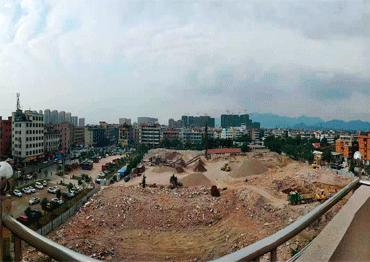“We were notified about the demolition quite suddenly. Officials came to ask us for our opinions a month after the local media reported the news,” Tian Feng, a manufacturer at Heyetang, told NewsChina.
“We didn’t take it seriously at first until we found out that some other industrial zones were already being knocked down,” Tian said. “So we went to see the people in the office in charge of our street, but they said they weren’t clear either, and the city government had notified them suddenly too. We tried the city officials, but they told us to go back to our local office.”
As one of Yiwu’s biggest industrial zones, Heyetang occupies 1,166 mu (0.78 square kilometers) of land. It includes 836 enterprises, only 152 of which have the right of land use. The rest are tenants. In 2019, some 18,000 people worked in the zone, equal to 1.5 percent of Yiwu’s permanent resident population, according to China’s sixth population census. That same year, the combined output of the zone’s enterprises with an annual business revenue of 20 million yuan (US$2.9m) or above reached 981 million yuan (US$144.3m).
Tian’s business started as a rural family workshop. He rented a space in Heyetang when they expanded, but was only able to buy land use rights for 30 years several years ago.
According to an article by Zhou Songqiang, the director of the City Condition Research Center under the Party School of the Yiwu Municipal Committee of the Communist Party of China, Yiwu is home to more than 8,000 enterprises which produce at least 800,000 kinds of novelties and accessories, such as brooches, necklaces and hair accessories. Around 3,000 producers have annual output exceeding 20 billion yuan (US$2.9b).
“I’ve been in this industry for almost 20 years, and the market demand [for trinkets and accessories] is still increasing, especially during the pandemic when many people stuck at home turned to crafting activities to kill time,” Tian said.
Tian was about to increase capacity when he got the demolition notice.
“They asked us to leave by January 2021, but I told them we need at least two years. We have to buy a new factory, but how can we raise the money we need so quickly? We were hit with big losses due to the pandemic, so right now we’re just focusing on surviving,” another businessman in Heyetang who did not reveal his name told NewsChina.
Zhang Liming, deputy director of the Yiwu Municipal Natural Resources and Planning Bureau, told NewsChina that the local government is still looking into the feasibility of expropriating the Heyetang Industrial Zone and has not yet published detailed policies on how to proceed. “The process will be in line with the law,” he said.
There are only two legal ways to expropriate land in China: either when the land is to be used for development in the public interest or by purchasing the land after negotiating with the enterprises involved.
Whichever way they try, moving so many firms in such a short time will prove tough. “I don’t think the government can do it if they follow the letter of the law... [government employees] often just go ahead before the actual policies are issued,” one official who is working on land expropriation in Yiwu told NewsChina on condition of anonymity.
Local media reported on the case of a township government overseen by Yiwu which demolished an industrial zone in three months after government employees allegedly made frequent visits to the zone’s firms, eventually persuading them to quit one month before the official demolition notice was issued.
Duan Li is dismayed by these tactics. “Do [government employees] have the right to drive enterprises out without any official documents?” he said.
“The enterprises’ land use rights are legally protected, so investors could lose confidence in Yiwu if the government expropriates land just by issuing documents that disregard whether the businesses are willing to leave,” Li Bin, a researcher focusing on the industrial development of Yiwu, told NewsChina. “Investors will worry that Yiwu would not protect their rights and interests,” he added.

 Old Version
Old Version

